
Henri René Albert Guy de Maupassant was a 19th-century French author, celebrated as a master of the short story, as well as a representative of the naturalist school, depicting human lives, destinies and social forces in disillusioned and often pessimistic terms.

The Picture of Dorian Gray is a philosophical novel by Irish writer Oscar Wilde. A shorter novella-length version was published in the July 1890 issue of the American periodical Lippincott's Monthly Magazine. The novel-length version was published in April 1891.

Henry James was an American-British author. He is regarded as a key transitional figure between literary realism and literary modernism, and is considered by many to be among the greatest novelists in the English language. He was the son of Henry James Sr. and the brother of philosopher and psychologist William James and diarist Alice James.

The Portrait of a Lady is a novel by Henry James, first published as a serial in The Atlantic Monthly and Macmillan's Magazine in 1880–81 and then as a book in 1881. It is one of James's most popular novels and is regarded by critics as one of his finest.

The Wings of the Dove is a 1902 novel by Henry James. It tells the story of Milly Theale, an American heiress stricken with a serious disease, and her effect on the people around her. Some of these people befriend Milly with honourable motives, while others are more self-interested.
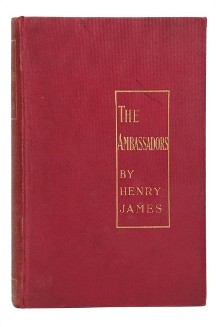
The Ambassadors is a 1903 novel by Henry James, originally published as a serial in the North American Review (NAR). The novel is a dark comedy which follows the trip of protagonist Lewis Lambert Strether to Europe to bring the son of his widowed fiancée back to the family business. The novel is written in the third-person, from Strether's point of view.

Succès de scandale is a term for any artistic work whose success is attributed, in whole or in part, to public controversy surrounding the work. In some cases the controversy causes audiences to seek out the work for its titillating content, while in others it simply heightens public curiosity. This concept is echoed by the phrase "there is no such thing as bad publicity".

"The Figure in the Carpet" is a short story by American writer Henry James first published in 1896. It is told in the first person; the narrator, whose name is never revealed, meets his favorite author and becomes obsessed with discovering the secret meaning or intention of all the author's works.

Charles Paul de Kock was a French novelist. Although one of the most popular writers of his day in terms of book sales, he acquired a literary reputation for low-brow output in poor taste. In 2021 Brad Bigelow wrote: "Today, if we set aside over-priced print on demand reprints of his ancient editions, the works of Paul de Kock haven't seen a new English edition in at least a century."

The American is a novel by Henry James, originally published as a serial in The Atlantic Monthly in 1876–77 and then as a book in 1877.
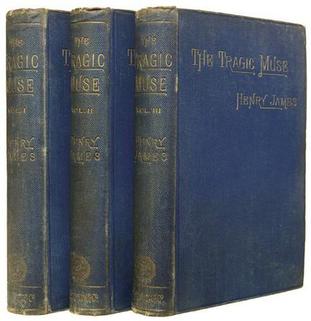
The Tragic Muse is a novel by Henry James, first published as a serial in The Atlantic Monthly in 1889–1890 and then as a book in 1890. This wide, cheerful panorama of English life follows the fortunes of two would-be artists: Nick Dormer, who throws over a political career in his efforts to become a painter, and Miriam Rooth, an actress striving for artistic and commercial success. A cast of supporting characters help and hinder their pursuits.
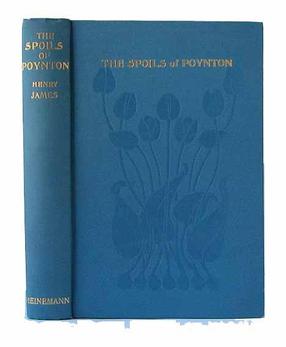
The Spoils of Poynton is a novel by Henry James, first published under the title The Old Things as a serial in The Atlantic Monthly in 1896 and then as a book in 1897. This novel traces the shifting relations among three people and a magnificent collection of art, decorative arts, and furniture arrayed like jewels in a country house called Poynton. Mrs. Gereth, a widow of impeccable taste and iron will, formed the collection over decades only to have it torn away from her when her son Owen decides to marry a frivolous woman. The story is largely told from the viewpoint of Fleda Vetch, a keenly intelligent young woman of straitened circumstances who, shortly after becoming the intimate friend and companion of Mrs. Gereth, falls in love with Owen. Sympathetic to Mrs. Gereth's anguish over losing the fine things she patiently collected, Fleda shuttles between the estranged mother and son, becoming ever more involved in their affairs.

Confidence is a novel by Henry James, first published as a serial in Scribner's Monthly in 1879 and then as a book later the same year. This light and somewhat awkward comedy centers on artist Bernard Longueville, scientist Gordon Wright, and the sometimes inscrutable heroine, Angela Vivian. The plot rambles through various romantic entanglements before reaching an uncomplicated, but still believable happy ending.
Philip Horne is a teacher and literary critic specializing in 19th century literature, particularly Henry James and Charles Dickens. Educated at King's College School and Cambridge University, he is currently Professor of English at University College London.

The New York Edition of Henry James' fiction was a 24-volume collection of the Anglo-American writer's novels, novellas and short stories, originally published in the U.S. and the UK between 1907 and 1909, with a photogravure frontispiece for each volume by Alvin Langdon Coburn. Two more volumes containing James' unfinished novels, The Ivory Tower and The Sense of the Past, were issued in 1917 in a format consistent with the original set. The entire collection was republished during the 1960s by Charles Scribner's Sons. The official title of the set was The Novels and Tales of Henry James, though the more informal title was suggested by James himself and appears as a subtitle on the series title page in each volume. It has been used almost exclusively by subsequent commentators.
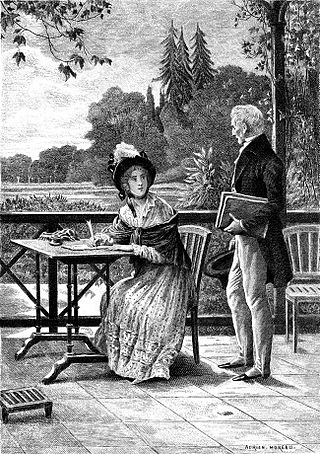
Mémoires de deux jeunes mariées is an epistolary novel by the French writer Honoré de Balzac. It was serialized in the French newspaper La Presse in 1841 and published by Furne in 1842 as the first work in the second volume of Balzac's La Comédie humaine. It was dedicated to the French novelist George Sand. The 1902 English translation of the novel included a preface by Henry James.

Henry Bacon was an American painter, author, illustrator, and translator. Before his formal training as an artist, he served as a soldier and war artist during the American Civil War, and was badly wounded in the Second Battle of Bull Run. He then studied in France, and became a member of the Pont-Aven School, painting genre subjects of French country life, many sold back in America. He first traveled to Egypt in 1897, and then developed an interest in Orientalist painting, soon spending his winters in the Middle East, dying in Cairo.
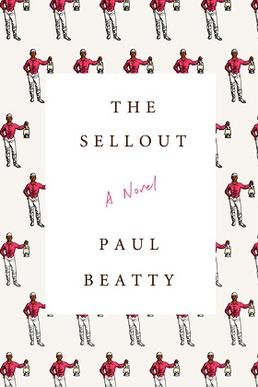
The Sellout is a 2015 novel by Paul Beatty published by Farrar, Straus and Giroux, and in the UK by Oneworld Publications in 2016. The novel takes place in and around Los Angeles, California, and muses about the state of racial relations in the U.S. today. In October 2016, it won the Booker Prize, making Beatty the first US writer to win that award.
Oscar Cargill was a writer, editor, and professor of English.













